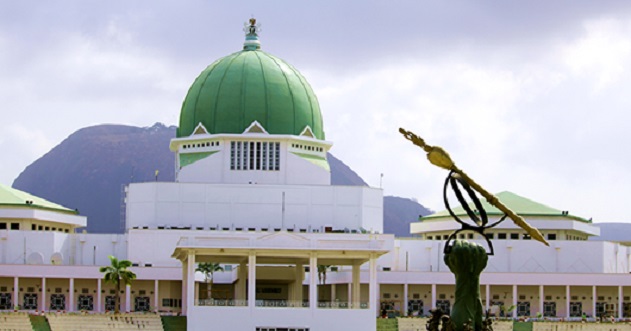Nass Republic
NASS REPUBLIC: On Salem’s one-man protest. Two other stories, and a quote to remember

Hon. Bamidele Salem, last week, urged President Muhammadu Buhari to ensure the release of the kidnapped victims of the, March 28, Abuja-Kaduna train attack which reportedly saw the abduction, and killing of no fewer than 68 and 8 persons respectively.
The National Assembly (NASS) was also a ground for other interesting developments. We picked two for your reading delight.
1. Salem’s lone protest
On June 1, Hon. Salem, representing Ede North/Ede South/Egbedore/Ejigbo Federal Constituency of Osun State in the House of Representatives, conducted a lone protest, calling on the Buhari-led administration to show leadership in seeing to the release of those still held captive after the Kaduna train attack.
Bamidele, who protested barefooted, walking from the popular unity fountain to the National Assembly in Abuja told journalists that “one of the key dimensions of this criminality is the unholy practice of kidnapping for ransom which, according reports, has spawned a billion Naira industry in the last seven years or so.”
“The kidnapped victims of that attack remain in captivity till this moment,” he added.
Salem’s lone protest depicts the growing public dissatisfaction with Nigerian government’s efforts at restoring confidence in the country’s security architecture. Indeed, his symbolic action amplifies the outcry and anguish of the kidnapped victims, and their relations.
It is doubtful if Salem’s action would cause a drastic turnaround in the fortunes of traumatized Nigerians, as evidenced in the fate of the kidnapped Abuja train passengers.
What cannot be taken away from his symbolic trek, however, is that it is capable of raising additional awareness on the plight of victims and prick the soul of the ruling elites to act right.
NASS MEMORY LANE
Who said;
“God created our land with so many resources. An average youth is a job seeker. However, the time has come for every youth to look inwards and see how he or she can become a problem solver, creating job opportunities instead of seeking one.”
Answer: See end of post
Two other stories
2. Kalu against money politics
The former Abia State Governor, and Chief Whip of the Senate, Orji Uzor Kalu, on June 2, expressed his dissatisfaction with the monetisation of the political process in the country.
“The earliest Nigerians and presidential aspirants understand that no amount of money can buy the President of the country, the better for everyone. It is only cohesion and consensus among the regions that can produce a President,” Kalu said via his verified Facebook page.
Kalu’s submission is right, but not new. He, however, must first admit that his party, the APC, is substantially guilty of the offense he is preaching against by placing a whopping sum of N100million on its presidential forms, thereby restricting access to participation in the electoral process to a few privileged Nigerians.
Read also: NASS REPUBLIC: Who wants Okorocha out of 2023 presidential race? Two other stories
Undoubtedly, the system has, over the years, been badly subjected to diverse degrees of financial malfeasance, as party delegates now bracingly vote for aspirants who give them the most cash.
This is the point where it gets bad, as absence of a credible, free and fair process ultimately casts doubts on the quality of leadership enthroned.
3. Probing Nigerian refineries
On June 3, the House of Representatives, stated that its resolve to probe the condition of the nation’s four refineries was to ascertain their viability, and the need to stop monetary approval for subsidy payments.
A member of the ad-hoc committee set up to carry out the investigation, Hon. Johnson Ogumah told journalists that “This exercise came as a result of the oil subsidy money that we are supposed to appropriate for again. We now say with this huge amount of money; we need to know what is happening to our refineries.”
The issues surrounding Nigeria’s refineries have shamefully lingered for years, which raises the fundamental question of what had become of past queries initiated by the same institution.
The concerns are largely expressed in the near lack of concrete evidence to show that sanctions had been brought against erring individuals who may have sabotaged the petroleum industry, in particular, and the economy at large.
So, while it cannot be denied that the petroleum sector remains very dysfunctional, only a forensic audit exercise can unravel the true state of things.
Until then, the legislature must take a substantial part of the blame for merely grandstanding in its many pretentious moves to query abuses in Nigeria’s oil and gas sector.
Answer: Hon. Shina Peller
Peller made the statement in May 2022 while addressing a coalition of progressive youths in Lagos State. He represents Iseyin/Itesiwaju/Iwajowa/Kajola Federal Constituency of Oyo State in the House of Representatives.
Join the conversation
Support Ripples Nigeria, hold up solutions journalism
Balanced, fearless journalism driven by data comes at huge financial costs.
As a media platform, we hold leadership accountable and will not trade the right to press freedom and free speech for a piece of cake.
If you like what we do, and are ready to uphold solutions journalism, kindly donate to the Ripples Nigeria cause.
Your support would help to ensure that citizens and institutions continue to have free access to credible and reliable information for societal development.



























